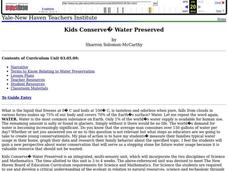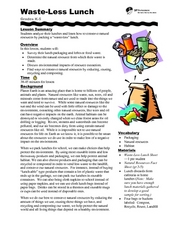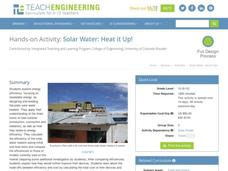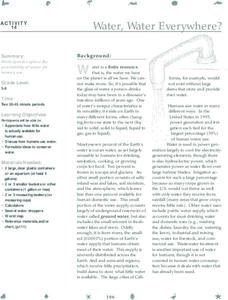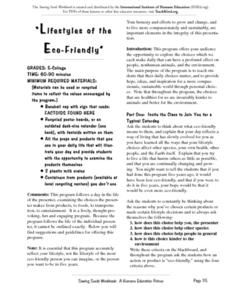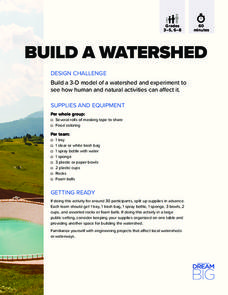Curated OER
Kids Conserve? Water Preserved
Middle schoolers study conservation and how cities obtain their water. In this water instructional activity students view a PowerPoint presentation and draw a picture of the water cycle.
Curated OER
Water: Our Most Important Beverage
Third graders complete a KWL chart on what they already know about water and what they want to know. As a class, they participate in an activity in which they discover the amount of drinkable water on Earth and are introduced to the...
Curated OER
Water, Glorious Water
Students identify the various uses of water. In this water conservation lesson, students read the book, The Drop In My Drink: The Story of Water On Our Planet and write down their favorite uses of water. Students illustrate how they can...
California Academy of Science
Sustainable Water Solutions: Weighing the Pros and Cons
Switching indoor water fixtures to low flow reduces water usage by more than 45 percent. This and other solutions to reduce water usage have both pros and cons. Scholars view videos of different solutions, discuss them in small groups,...
Curated OER
Water Pollution Prevention and Conservation
Learners examine how to conserve water. They also discover how to prevent water pollution. They examine the Earth's water distribution as well.
SF Environment
Waste-Less Lunch
Is it possible to have a waste-less lunch? Can your class become leaders in conservation? Discuss the importance of reducing waste during lunch time with a fun lesson that can be extended to everyday practices. First the class examines...
Groundwater Foundation
How Wet Is Our Planet?
Here's a powerful demonstration that makes the point that it is everyone's responsibility to conserve water and protect the earth's limited supply of fresh water.
Curated OER
Waterdrops
In this science worksheet, students learn the importance of water conservation by completing 6 pages in the color newsletter. Students list ways their school could save water, read cartoon tips for home water conservation and complete a...
Teach Engineering
Solar Water: Heat it Up!
Young engineers are instructed to design and build their own solar water heaters. Then, they calculate the efficiency and cost and compare them to commercially available models. This is a full unit for pupils to apply their knowledge.
Library of Congress
The Conservation Movement at a Crossroads: The Hetch Hetchy Controversy
Should wilderness areas be preserved or managed? Class members examine primary source documents, including lecture notes, articles, essays and congressional records to better understand the Hetch Hetchy controversy that created a split...
US Geological Survey
Water, Water, Everywhere?
Less than one percent of the earth's water is available for human use. A hands-on activity models the phenomenon for young scientists. Beginning with a specific volume of water, learners remove water that correlates to the percent of...
EngageNY
Gathering Information about Water Management: Assessing and Reading Internet Sources, Day 3
Water is life! Using the informative resource, scholars first read two informational articles about water management in agriculture. Then, they use a Venn diagram to contrast the different types of evidence authors use to support a...
Curated OER
Lifestyles of the Eco-Friendly
A helpful instructional activity encourages pupils to make environmentally-friendly choices at home. The packet presents many ways that learners can help the environment, such as taking shorter showers in order to conserve water.
Curated OER
"Water is Life" Global Water Awareness
Students examine and calculate the percentage of potable water remaining on the earth. In this ecology and geography lesson, students brainstorm the main factors affecting water distribution. Students use mathematical problem solving to...
Curated OER
"Water Has Many Uses" Mini-unit
Students understand the importance of water as a resource in our lives. In this water mini-unit students recognize that not all countries have water available as we do. Students discuss and explain a plan for responsibilities of getting...
Curated OER
Uses of Water
Students plan for a water shortage in their area. In this water lesson, students analyze water usage and plan and share a reduction plan. Groups share their results and calculate the averages. Students analyze how water...
Curated OER
Water Resources and the Role of the Independent Sector
Students identify the need to maintain and protect our natural resources. For this natural resource lesson, students study pictures of the effects of pollution on animals and water. Students brainstorm a list of ways water is an...
Curated OER
Renewable vs. Non-Renewable Resources
Here's a fine lesson plan on renewable and non-renewable sources of energy for your 5th graders. In it, learners list a number of natural resources on the board, then try to sort the resources into appropriate categories. This helps them...
Baylor College
How Can We Find Out What Is in Water?
Using paper chromatography, water watchers discover that several substances might be dissolved even though they aren't visible. In this case, you will prepare a mixture of three different food colorings for them to experiment with. A...
Project WET Foundation
Soap and Water Science
Learn about germs without getting sick! An interactive resource prompts learners to identify the dirtiest surfaces on a city street. Class members then participate in a demonstration about washing dirty hands and how using soap can...
Curated OER
Scarcity of Water Throughout the World
Students identify the various forms of fresh water on the earth. They observe a demonstration aand read articles that show them the importance of water conservation. They write a journal about their opinion regarding paying for water.
Curated OER
Water Conservation
Students investigate water conservation. In this water conservation lesson, students list the uses for water and record their water usage for one day. Students graph the data and create a water conservation poster.
Columbus City Schools
ABC: Acid Base Chemistry
Bubble, bubble, boil and trouble! What causes common substances like baking soda and vinegar to react the way they do? Welcome your junior chemists to the wonders of acid-base chemistry using a comprehensive and fun...
DiscoverE
Build a Watershed
What's the best way to learn how watersheds work? Build one! Combining engineering, the water cycle, and ecology concerns, the activity is the perfect fit for an interdisciplinary unit. Teams construct a model watershed with simple...
